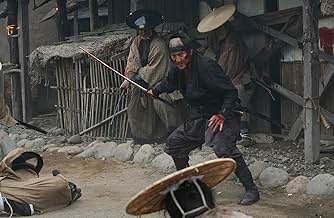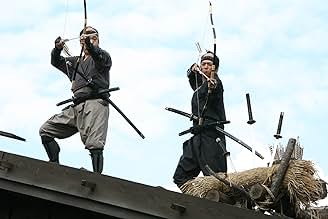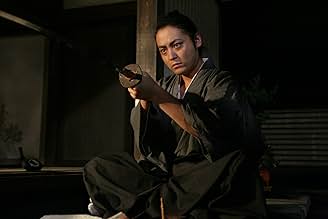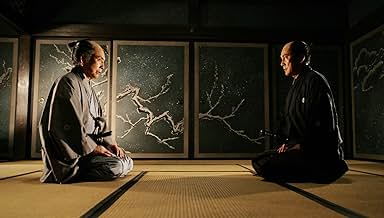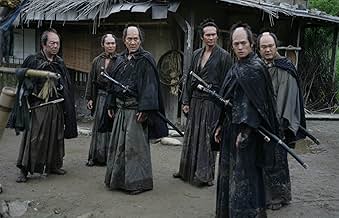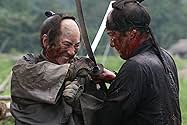VALUTAZIONE IMDb
7,5/10
70.360
LA TUA VALUTAZIONE
Un gruppo di assassini si riunisce per una missione suicida per uccidere un signore del male.Un gruppo di assassini si riunisce per una missione suicida per uccidere un signore del male.Un gruppo di assassini si riunisce per una missione suicida per uccidere un signore del male.
- Regia
- Sceneggiatura
- Star
- Premi
- 15 vittorie e 28 candidature totali
Recensioni in evidenza
Samurai films tend to lean toward either overly talkative and boring or hyper-stylized to the point that credibility comes into question. Striking that middle ground, however, can lead to greatness, or rather — great honor. Takashi Miike's "13 Assassins" might not match the great Akira Kurosawa films, but boy does it come close, and it does so with themes and blades of equal sharpness.
If swords-and-sandals flick "300" had been less concerned about abs and Gerard Butler screaming war hyperbole, it would have looked and felt like this film. Anyone who hails Zack Snyder's 2006 film as a masterpiece should pull up a seat with this film for two-plus hours and see how it's really done.
Both the aforementioned film to which comparison is inescapable and "13 Assassins" tell a story about how the number of men indicated in their titles fought against an army numerous times the size. In this film, the reasons for fighting a battle most certain to result in death are less glossy and brash, as well as guided by some consideration for historical relevance.
The story takes place at nearly the end of feudal era Japan, when samurai have become nothing but show thanks to a lengthy time of peace. Yet one lord seems to undermine this peace with acts of cold-blooded violence: the shogun's half brother, Lord Naritsugu (Gorô Inagaki). It is expected, however, that when he returns from Edo, he will have a place on the shogun's council and have political influence to go with with warmongering ways. After a respected samurai commits harakiri in protest, the elder of the shogun council charges a samurai named Shinzaemon (Kôji Yakusho) with putting together a squad of samurai to kill Naritsugu before there's widespread unrest.
The beginning of the film shows us Naritsugu's cold and horrifying ways with enough brutal imagery to make anyone want to pick up a sword against this guy. The story then continues with the assembling of the 12 assassins (the 13th comes later) and their strategy for accomplishing the task. Yet on the other side is Hanbei Kitou (Masachika Ichimura), the samurai sworn to obey and protect Naritsugu who must develop counter-strategy to foil Shinzaemon, an old classmate of his from the dojo.
The game of strategy boils toward a 45-minute climactic battle in which the 13 assassins use everything from trickery to explosives to straight-up sword hackery against an army of 200 men from Naritsugu's clan. The delivery of these sequences rivals any modern action film, and that includes battle cries, little humorous lines tossed in for fun and especially creativity. One samurai takes out 30-plus guys in a narrow corridor that he prepped ahead of time with several swords carefully stationed throughout.
But most impressively, "13 Assassins" never loses sight of what its whole conflict is about. The plot doesn't exist merely as a formula guaranteed to produce an unforgettable culminating battle. Throughout the entire film, characters are questioning the values passed down to them for hundreds of years of honor and duty. Having essentially stood their whole lives as symbols of a fading age, they take on this quest in search of finally fulfilling that purpose of total commitment and servitude, yet this battle will teach them what it truly means.
Essentially, this is not the same movie if set in another time or another place, which sets it apart as a truly great action film. As replicable as a story of a small band of skilled warriors taking on the impossible is (it possesses a great number of similarities to what's considered the best of its kind, Kurosawa's "Seven Samurai," for one), writers Kaneo Ikegami and Daisuke Tengan give "13 Assassins" its own thumbprint with the context.
Miike then delivers the full impact of all the tones from pure syrupy action to dark, shocking drama. He knows exactly how to take a high-tension scene to a whole other level by creating a full spectrum of what we see versus what is kept from us, especially in terms of violence. As soon as he wants to export those talents to Hollywood, someone better answer. We could use more action films like "13 Assassins."
~Steven C
Visit my site! moviemusereviews.com
If swords-and-sandals flick "300" had been less concerned about abs and Gerard Butler screaming war hyperbole, it would have looked and felt like this film. Anyone who hails Zack Snyder's 2006 film as a masterpiece should pull up a seat with this film for two-plus hours and see how it's really done.
Both the aforementioned film to which comparison is inescapable and "13 Assassins" tell a story about how the number of men indicated in their titles fought against an army numerous times the size. In this film, the reasons for fighting a battle most certain to result in death are less glossy and brash, as well as guided by some consideration for historical relevance.
The story takes place at nearly the end of feudal era Japan, when samurai have become nothing but show thanks to a lengthy time of peace. Yet one lord seems to undermine this peace with acts of cold-blooded violence: the shogun's half brother, Lord Naritsugu (Gorô Inagaki). It is expected, however, that when he returns from Edo, he will have a place on the shogun's council and have political influence to go with with warmongering ways. After a respected samurai commits harakiri in protest, the elder of the shogun council charges a samurai named Shinzaemon (Kôji Yakusho) with putting together a squad of samurai to kill Naritsugu before there's widespread unrest.
The beginning of the film shows us Naritsugu's cold and horrifying ways with enough brutal imagery to make anyone want to pick up a sword against this guy. The story then continues with the assembling of the 12 assassins (the 13th comes later) and their strategy for accomplishing the task. Yet on the other side is Hanbei Kitou (Masachika Ichimura), the samurai sworn to obey and protect Naritsugu who must develop counter-strategy to foil Shinzaemon, an old classmate of his from the dojo.
The game of strategy boils toward a 45-minute climactic battle in which the 13 assassins use everything from trickery to explosives to straight-up sword hackery against an army of 200 men from Naritsugu's clan. The delivery of these sequences rivals any modern action film, and that includes battle cries, little humorous lines tossed in for fun and especially creativity. One samurai takes out 30-plus guys in a narrow corridor that he prepped ahead of time with several swords carefully stationed throughout.
But most impressively, "13 Assassins" never loses sight of what its whole conflict is about. The plot doesn't exist merely as a formula guaranteed to produce an unforgettable culminating battle. Throughout the entire film, characters are questioning the values passed down to them for hundreds of years of honor and duty. Having essentially stood their whole lives as symbols of a fading age, they take on this quest in search of finally fulfilling that purpose of total commitment and servitude, yet this battle will teach them what it truly means.
Essentially, this is not the same movie if set in another time or another place, which sets it apart as a truly great action film. As replicable as a story of a small band of skilled warriors taking on the impossible is (it possesses a great number of similarities to what's considered the best of its kind, Kurosawa's "Seven Samurai," for one), writers Kaneo Ikegami and Daisuke Tengan give "13 Assassins" its own thumbprint with the context.
Miike then delivers the full impact of all the tones from pure syrupy action to dark, shocking drama. He knows exactly how to take a high-tension scene to a whole other level by creating a full spectrum of what we see versus what is kept from us, especially in terms of violence. As soon as he wants to export those talents to Hollywood, someone better answer. We could use more action films like "13 Assassins."
~Steven C
Visit my site! moviemusereviews.com
Takashi Miike is arguably one of Japan's hardest working directors who has tackled several different genres, generally with good results. It used to be he would do a dozen or so projects a year, and more in his earlier days. This, of course, has diminished in place of bigger projects, but the man still remains one of Japan's most well known and prolific directors. So, it shouldn't surprise anyone that his undertaking of yet another new genre, the samurai epic, is something of a highly anticipated film. And yes, it succeeds in being another brilliant masterpiece from the man.
13 Assassins, though full of characters, is quite simple actually. A master Shogun samurai is charged with the killing of a cruel and masochistic Shogun lord before he can become more influential in the Japanese Shogunate. With this mission, he gathers together 13 samurai to join him in what appears to be a mostly suicidal mission as they take on a small army of soldiers. For years I have argued that Miike is a master filmmaker that doesn't get nearly the kind of recognition he deserves, as his experience and resume put him up with the likes of other classic filmmakers. This shows in Assassins as he brilliantly puts together this simple, yet purposeful film that calls back to the era of epic samurai films of the likes of Akira Kurosawa. In fact, the influence of Seven Samurai is quite apparent here, even going so far as to model some similar characters. However, do not be mistaken, as this is very much a Miike film, a combination of his abilities to craft a mainstream film and a cult hit.
And the trademarks are certainly there, with the sadistic young Shogun lord bearing the bizarre violent fetishes that have been displayed in Miike's more obscure works, namely Ichi the Killer. As you might suspect, the violence early on is shocking, effective, and often unexpected. This gives way later on to more stylish violence, but none the less, the film is incredibly violent, worthy of a hard R rating by American standards. Miike fans should be very pleased as he both employs his skills as a filmmaker while at the same time adhering to the general guidelines of making a samurai film. Here, he delves greatly into the genre, showing what it means to be a samurai and questioning their purpose through multiple views. Our master samurai, Shinzaemon, sees samurai as being for the people, while Hanbei, his rival, sees them as entirely in servitude to their master without question. Even the young lord, Shinzaemon's target, has a view, thought it is certainly the most negative of any of them.
If I have any complaints, it's two. First, the film does little exposition of the large cast and most of the assassins are simply there to be a fighting force. We learn very little about most of them, and even the samurai we do learn about, including Shinzaemon, get little exposition besides what we already expect, that he's a great samurai of justice. The second would be the clunking over the head about samurai ideals. Miike continues to push messages we've already acquired early in the film and it becomes slightly redundant by the end. However, these are minor complaints that are mostly easily ignored as the film runs at a fast pace with a 45 minute battle that is one of the best samurai battles I've seen on film, comparing to Azumi or Zatoichi's finale, but arguably handled better and with a master's touch.
It's hard to know if this is Miike's pinnacle. He certainly creates a modern samurai masterpiece of an epic here. One particularly powerful scene will remain with you for a long time, and this is the power of Miike's film, one that goes to places many are afraid to tread to leave a lasting impression. Violent, entertaining, and with good examination of the samurai and their duties, fans of Miike's previous films and fans of the samurai epic will not be disappointed.
13 Assassins, though full of characters, is quite simple actually. A master Shogun samurai is charged with the killing of a cruel and masochistic Shogun lord before he can become more influential in the Japanese Shogunate. With this mission, he gathers together 13 samurai to join him in what appears to be a mostly suicidal mission as they take on a small army of soldiers. For years I have argued that Miike is a master filmmaker that doesn't get nearly the kind of recognition he deserves, as his experience and resume put him up with the likes of other classic filmmakers. This shows in Assassins as he brilliantly puts together this simple, yet purposeful film that calls back to the era of epic samurai films of the likes of Akira Kurosawa. In fact, the influence of Seven Samurai is quite apparent here, even going so far as to model some similar characters. However, do not be mistaken, as this is very much a Miike film, a combination of his abilities to craft a mainstream film and a cult hit.
And the trademarks are certainly there, with the sadistic young Shogun lord bearing the bizarre violent fetishes that have been displayed in Miike's more obscure works, namely Ichi the Killer. As you might suspect, the violence early on is shocking, effective, and often unexpected. This gives way later on to more stylish violence, but none the less, the film is incredibly violent, worthy of a hard R rating by American standards. Miike fans should be very pleased as he both employs his skills as a filmmaker while at the same time adhering to the general guidelines of making a samurai film. Here, he delves greatly into the genre, showing what it means to be a samurai and questioning their purpose through multiple views. Our master samurai, Shinzaemon, sees samurai as being for the people, while Hanbei, his rival, sees them as entirely in servitude to their master without question. Even the young lord, Shinzaemon's target, has a view, thought it is certainly the most negative of any of them.
If I have any complaints, it's two. First, the film does little exposition of the large cast and most of the assassins are simply there to be a fighting force. We learn very little about most of them, and even the samurai we do learn about, including Shinzaemon, get little exposition besides what we already expect, that he's a great samurai of justice. The second would be the clunking over the head about samurai ideals. Miike continues to push messages we've already acquired early in the film and it becomes slightly redundant by the end. However, these are minor complaints that are mostly easily ignored as the film runs at a fast pace with a 45 minute battle that is one of the best samurai battles I've seen on film, comparing to Azumi or Zatoichi's finale, but arguably handled better and with a master's touch.
It's hard to know if this is Miike's pinnacle. He certainly creates a modern samurai masterpiece of an epic here. One particularly powerful scene will remain with you for a long time, and this is the power of Miike's film, one that goes to places many are afraid to tread to leave a lasting impression. Violent, entertaining, and with good examination of the samurai and their duties, fans of Miike's previous films and fans of the samurai epic will not be disappointed.
This film was a dark-edged delight from beginning to end when I saw it at the 2010 edition of TIFF. The audience there loved it too, breaking out into spontaneous applause during several scenes.
Solid direction by Miike, great characters, beautifully shot and simply some of the best and most intense action sequences put on film - ever! It does have it's obvious influences, such as Kurosawa's "Seven Samurai", but damn, this one kicks ass mightily! You've never seen Shogun like this! And something else to point out: the sound on this film was thundering, shaking and stellar! THIS is the kind of film that reminds us why we go to a movie theatre to enjoy a film on a big screen, why we turn off our cell phones and immerse ourselves in the experience of cinema-going, as opposed to staying home on our couches.
I'll go see it again on the big screen when it hopefully returns to town - you can bet on that!
Solid direction by Miike, great characters, beautifully shot and simply some of the best and most intense action sequences put on film - ever! It does have it's obvious influences, such as Kurosawa's "Seven Samurai", but damn, this one kicks ass mightily! You've never seen Shogun like this! And something else to point out: the sound on this film was thundering, shaking and stellar! THIS is the kind of film that reminds us why we go to a movie theatre to enjoy a film on a big screen, why we turn off our cell phones and immerse ourselves in the experience of cinema-going, as opposed to staying home on our couches.
I'll go see it again on the big screen when it hopefully returns to town - you can bet on that!
This is an epic masterpiece and is clearly a cut above most films in direction, acting, and cinematography. But what really sets it apart is that it connects the viewer to Bushido and has those values firmly at its core.
The sadistic tyrant who must be assassinated or Japan will turn once more to feudal warfare is told with verve and elan, but also with real dignity and a great sense of pace. The first hour is simply superb as we watch the recruiting and planning of the assassins. The second hour is a maelstrom of action with katanas flashing and impossible odds. I actually preferred the first half in the main, but absolutely no complaints with the action either.
All in all, this is simply, by far and away, the best action film of 2011 so far, but putting in a genre does not do it justice - for this reviewer, it is the most complete cinematic experience since Winter's Bone and is that rare animal these days - a film that looks, feels, and produces the sensation of film rather than TV.
Probably one of the better films (Japanese or otherwise) I have seen this decade without exaggeration - it actually attempts to embody Bushido and understand the meaning and purpose of the Shogunate and the Samurai - plus Katanas - oh yes - lots and lots of katanas.....
The sadistic tyrant who must be assassinated or Japan will turn once more to feudal warfare is told with verve and elan, but also with real dignity and a great sense of pace. The first hour is simply superb as we watch the recruiting and planning of the assassins. The second hour is a maelstrom of action with katanas flashing and impossible odds. I actually preferred the first half in the main, but absolutely no complaints with the action either.
All in all, this is simply, by far and away, the best action film of 2011 so far, but putting in a genre does not do it justice - for this reviewer, it is the most complete cinematic experience since Winter's Bone and is that rare animal these days - a film that looks, feels, and produces the sensation of film rather than TV.
Probably one of the better films (Japanese or otherwise) I have seen this decade without exaggeration - it actually attempts to embody Bushido and understand the meaning and purpose of the Shogunate and the Samurai - plus Katanas - oh yes - lots and lots of katanas.....
I'm a huge fan of Takashi Miike, so I was very excited to be able to attend a sneak peek of his latest film. Miike's one of those directors who seems to be trying to make at least one film in every style, and this latest is his foray into the classic "samurai avenging injustices" genre. Only, we all know by now that Miike's style is anything but "classic." He always manages to find a way to infuse his own unique, warped imprint into everything he touches. Especially since he insists on making the most bizarre cameos possible in all the films he directs. They are always really fun to watch for.
So, this film is great. It starts off just as slowly as any of these old period pieces set in feudal era Japan, but it quickly descends into pure mayhem and madness. Shinzaemon is a retired samurai, but he is prompted back into action when he learns that the Shogun's "adopted" (code for bastard) son, Lord Naritsugu, has been terrorizing peasants. He's been killing and mutilating men, women and children all throughout the land, and all with the most cold- hearted, disinterested cruelty. So Shinzaemon decides to assemble a band of other idle samurai to hunt this despot down and assassinate him. Those would be the thirteen assassins that give this film its title. And they really are a very mismatched band of warriors. And these men are caricatures—each outrageous in his own way.
The one thing I really love about Takashi Miike's style is that he's never afraid to just go for it. He's got no shame, and absolutely no restraint. I think this is because he has a deep-rooted sense of humor (albeit a very dark one). It's an ability to identify and appreciate the absurdity in life. Miike's films have a reputation for being pretty violent and bloody (and this one is certainly no exception). But they are also incredibly funny. The gore is certainly meant to shock, but I don't think it's just for the sake of a cheap thrill. I think it's meant to throw us of balance. His work is horrifying where we expect delicacy, and actually quite subtle where viewers typically expect to find vulgarity. Of course, we can always count on Miike for some truly silly stunts too. The result is audiences that are quite delighted and amused, even after witnessing all the horror and disfigurement and devastation. Those moments are upsetting and heartbreaking, for sure. But, Miike really understands how a film should flow, and balances these difficult scenes with the right dose of irreverence. He's a true master, and this film is a roaring success.
So, this film is great. It starts off just as slowly as any of these old period pieces set in feudal era Japan, but it quickly descends into pure mayhem and madness. Shinzaemon is a retired samurai, but he is prompted back into action when he learns that the Shogun's "adopted" (code for bastard) son, Lord Naritsugu, has been terrorizing peasants. He's been killing and mutilating men, women and children all throughout the land, and all with the most cold- hearted, disinterested cruelty. So Shinzaemon decides to assemble a band of other idle samurai to hunt this despot down and assassinate him. Those would be the thirteen assassins that give this film its title. And they really are a very mismatched band of warriors. And these men are caricatures—each outrageous in his own way.
The one thing I really love about Takashi Miike's style is that he's never afraid to just go for it. He's got no shame, and absolutely no restraint. I think this is because he has a deep-rooted sense of humor (albeit a very dark one). It's an ability to identify and appreciate the absurdity in life. Miike's films have a reputation for being pretty violent and bloody (and this one is certainly no exception). But they are also incredibly funny. The gore is certainly meant to shock, but I don't think it's just for the sake of a cheap thrill. I think it's meant to throw us of balance. His work is horrifying where we expect delicacy, and actually quite subtle where viewers typically expect to find vulgarity. Of course, we can always count on Miike for some truly silly stunts too. The result is audiences that are quite delighted and amused, even after witnessing all the horror and disfigurement and devastation. Those moments are upsetting and heartbreaking, for sure. But, Miike really understands how a film should flow, and balances these difficult scenes with the right dose of irreverence. He's a true master, and this film is a roaring success.
Lo sapevi?
- QuizThe opening sequence of this film is a shot by shot recreation of the 1960s era original.
- Citazioni
Kujuro Hirayama: No mercy! There's no samurai code or fair play in battle! No sword? Use a stick. No stick? Use a rock. No rock? Use your fists and feet! Lose your life, but make the enemy pay!
- Curiosità sui creditiAlthough most of the opening credits after the distributor's name are in Japanese, there are three in English: Recorded Picture Company, Yahoo! Japan, and Tsutaya.
- Versioni alternativeThe runtime of the Japanese release is 141 minutes, for but the international distribution a reduced cut of 126 minutes was released, which among other things omits some scenes referring to Japanese mythology (such as several scenes which indicate that the hunter Koyata is not of human flesh, but a demon).
- ConnessioniFeatured in At the Movies: Venice Film Festival 2010 (2010)
I più visti
Accedi per valutare e creare un elenco di titoli salvati per ottenere consigli personalizzati
Dettagli
- Data di uscita
- Paesi di origine
- Siti ufficiali
- Lingua
- Celebre anche come
- 13 asesinos
- Luoghi delle riprese
- Aziende produttrici
- Vedi altri crediti dell’azienda su IMDbPro
Botteghino
- Budget
- 6.000.000 USD (previsto)
- Lordo Stati Uniti e Canada
- 802.778 USD
- Fine settimana di apertura Stati Uniti e Canada
- 45.854 USD
- 1 mag 2011
- Lordo in tutto il mondo
- 18.689.058 USD
- Tempo di esecuzione2 ore 21 minuti
- Colore
- Mix di suoni
- Proporzioni
- 2.35 : 1
Contribuisci a questa pagina
Suggerisci una modifica o aggiungi i contenuti mancanti

Divario superiore
By what name was 13 assassini (2010) officially released in India in English?
Rispondi



